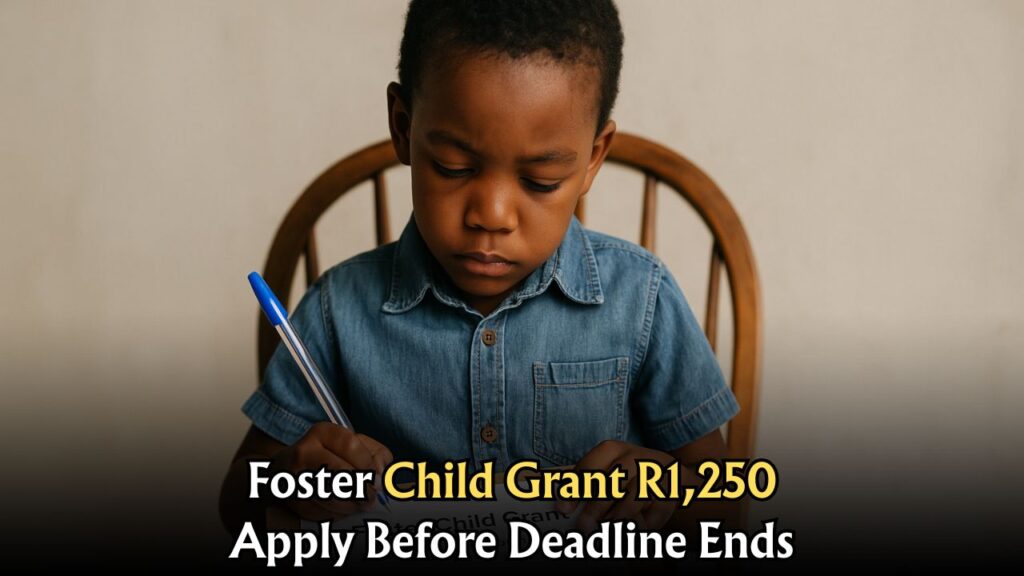Foster Child Grant Application: In South Africa, the Foster Child Grant provides critical financial support to families caring for foster children, offering R1,250 per month. It is essential for eligible families to apply promptly to ensure they receive this vital assistance before the deadline. The grant aims to alleviate some of the financial burdens associated with raising a child, particularly for foster parents who have taken on this important role. The South African Social Security Agency (SASSA) manages this grant, ensuring that families receive timely and consistent payments. As the deadline approaches, it’s crucial for potential applicants to understand the eligibility criteria and application process to secure this support.

Understanding the Foster Child Grant R1,250 Eligibility Requirements
The Foster Child Grant is specifically designed to support families who have taken in children through formal foster care arrangements. To qualify for this grant, applicants must meet certain criteria set by SASSA. Firstly, the child must be under the age of 18 and placed in the care of foster parents by a court order. This legal requirement ensures that the child’s placement is official and recognized by the authorities. Additionally, the grant is only available to South African citizens, permanent residents, or refugees residing in the country. It is important for foster parents to present valid identification documents, as well as the court order verifying the foster care arrangement, when applying for the grant. Understanding and meeting these eligibility requirements is the first step towards securing the financial support necessary to provide a stable and nurturing environment for foster children.
Steps to Apply for the Foster Child Grant Before the Deadline
Applying for the Foster Child Grant requires careful preparation and adherence to the application process outlined by SASSA. Prospective applicants should start by gathering all necessary documentation, including their South African ID, the child’s birth certificate, and the official court order for foster care placement. Once all documents are in order, applicants can visit their nearest SASSA office to submit their application. It is advisable to contact the office beforehand to confirm specific requirements and avoid any potential delays. During the application process, SASSA officials will verify the documents and information provided. After submission, applicants will receive a receipt confirming their application, which they should keep for future reference. Timeliness is crucial, as missing the deadline could result in delayed payments or the need to reapply. By following these steps diligently, foster parents can ensure they receive the grant without unnecessary complications.
Why the Foster Child Grant R1,250 is Vital for South African Families
The Foster Child Grant provides essential financial support that helps foster families meet the additional costs of raising a child. This support goes beyond mere financial aid; it facilitates a better quality of life for the child by enabling foster parents to provide adequate food, clothing, education, and healthcare. In South Africa, where economic challenges and unemployment rates are significant, the grant serves as a lifeline for many families. By alleviating some of the financial pressures, the grant allows foster parents to focus on providing emotional and social support to the children in their care. The impact of this financial assistance extends to the broader community by promoting stability and cohesion, ultimately contributing to a stronger, more supportive society. Recognizing the importance of such grants is crucial for ensuring the well-being of the next generation.
Addressing Common Concerns About the Foster Child Grant Application
Many foster parents often have concerns and questions about the application process for the Foster Child Grant. One common concern is the fear of rejection due to incomplete documentation. To address this, SASSA provides guidance and resources to help applicants understand exactly what is required. Another issue is the length of time it takes to process applications and receive payments. While processing times can vary, SASSA is committed to ensuring timely distribution of funds once the application is approved. It is also important for applicants to understand their rights and responsibilities once they start receiving the grant. Any changes in the child’s circumstances, such as adoption or returning to their biological family, should be reported to SASSA immediately to avoid complications. By staying informed and proactive, foster parents can navigate the grant application process with confidence and secure the financial support necessary for the well-being of the children in their care.




